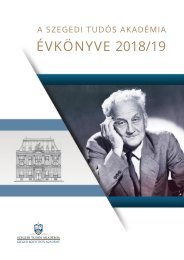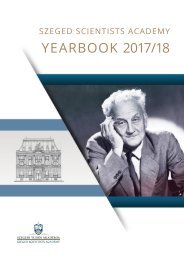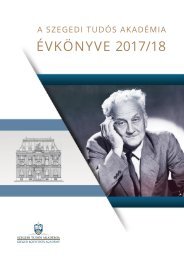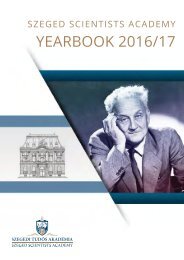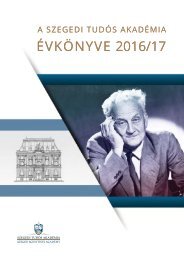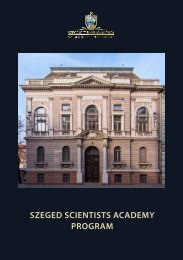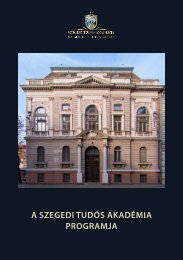Create successful ePaper yourself
Turn your PDF publications into a flip-book with our unique Google optimized e-Paper software.
SZENT-GYÖRGYI MENTORS<br />
ATTILA GÁCSER<br />
Department of Microbiology,<br />
University of Szeged<br />
Address: Közép fasor 52., H-6726 Szeged, Hungary<br />
RESEARCH AREA<br />
Infectious diseases are one the leading causes of mortality<br />
worldwide, killing millions of people every year. While<br />
bacteria and viruses cause the majority of deadly infections,<br />
notably the number of fungal diseases is increasing at an<br />
alarming rate. In fact, it is estimated that nearly as many<br />
people die annually from invasive fungal infections as<br />
from the greatly feared tuberculosis (1.4 million) or malaria<br />
(1.2 million). Our research program focuses on the most<br />
common human fungal pathogens, the opportunistic<br />
Candida species with special focus on C. parapsilosis. We<br />
investigate the basic mechanisms of fungal pathogenesis<br />
and host immunity, and we aim to improve diagnosis and<br />
identify novel biomarkers of infection. Recently, we also<br />
investigate the role of the human “mycobiome” in health<br />
and disease development and progression.<br />
TECHNIQUES AVAILABLE IN THE LAB<br />
In vitro infection models using phagocytes (murine and<br />
human cell lines, primer immune cells). Measurement of<br />
fungal cell phagocytosis with Flow Cytometry or microscopy,<br />
cytokines-chemokines with ELISA, host damage with<br />
LDH-assay. Quantitative imaging using FlowSight. In vivo<br />
infection models using wild type and transgenic mice.<br />
Colony formig unit measurements from different organs,<br />
histological analysis, immune cell preparation from infected<br />
animals. Basic and advanced molecular techniques, qRT-<br />
PCR, Western blot, Southern blot, CRISPR/Cas9 technology,<br />
GATEWAY-cloning system.<br />
SELECTED PUBLICATIONS<br />
Tóth, A., Zajta, E., Csonka, K., Vágvölgyi, C., Netea, M.G.,<br />
Gácser, A. (2017) Specific pathways mediating inflammasome<br />
activation by Candida parapsilosis. Sci Rep 7:<br />
43129.<br />
Pryszcz, L.P., Nemeth, T., Saus, E., Ksiezopolska, E.,<br />
Hegedusova, E., Nosek, J., Wolfe, K.H., Gácser, A., Gabaldon,<br />
T. (2015) The Genomic Aftermath of Hybridization in the<br />
Opportunistic Pathogen Candida metapsilosis. PLOS<br />
Genetics 11: e1005626. 29 p. joint senior authors<br />
Tóth, R., Alonso, M.F., Bain, J.M., Vágvölgyi, C., Erwig, L-P.,<br />
Gácser, A. (2015) Different Candida parapsilosis clinical<br />
isolates and lipase deficient strain trigger an altered cellular<br />
immune response. Front Microbiol 6: 1102. 11 p.<br />
Toth, A., Csonka, K., Jacobs, C., Vagvolgyi, C., Nosanchuk,<br />
J.D., Netea, M.G., Gácser, A. (2013) Candida albicans and<br />
Candida parapsilosis Induce Different T-Cell Responses in<br />
Human Peripheral Blood Mononuclear Cells. J Infect Dis<br />
208: 690-698.<br />
Lázár-Molnár, E., Gácser, A., Freeman, G.J., Almo, S.C.,<br />
Nathenson, S.G., Nosanchuk, J.D. (2008) The PD-1/PD-L<br />
costimulatory pathway critically affects host resistance to<br />
the pathogenic fungus Histoplasma capsulatum. Proc Natl<br />
Acad Sci USA 105: 2658-2663. joint first authors<br />
49






